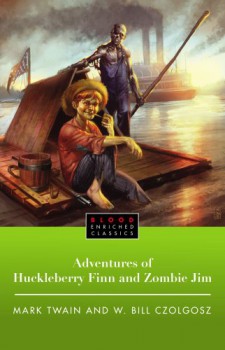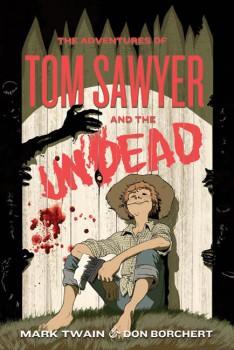Don Lee Reviews The Adventures of Huckleberry Finn and Zombie Jim and The Adventures of Tom Sawyer and the Undead
 The Adventures of Huckleberry Finn and Zombie Jim: Mark Twain’s Classic with Crazy Zombie Goodness
The Adventures of Huckleberry Finn and Zombie Jim: Mark Twain’s Classic with Crazy Zombie Goodness
Mark Twain and W. Bill Czolgosz
Coscom Entertainment (206 pp, $15.99, 2009)
The Adventures of Tom Sawyer and the Undead
Mark Twain and Don Borchert
Tor (304 pp, $13.99, 2010)
Reviewed by Don Lee
I like zombies better than vampires. It is a lot harder to prettify zombies. They shamble. They eat brains. You blow their brains out. In origin, of course, the Romero-esque brain-eating zombies have about as much to do with “real” Haitian zombies as the sexy noble vampires of Twilight have to do with the monster that is Dracula, much less the original walking bags-of-blood from whose folklore the modern literary vampire descends.
The Adventures of Huckleberry Finn and Zombie Jim: Mark Twain’s Classic with Crazy Zombie Goodness, and The Adventures of Tom Sawyer and The Undead are, of course, part of the recent trend of Classic Novel plus fill-in-the-blank-monster that has brought us such gems as Little Vampire Women, Queen Victoria: Demon Hunter, Sense and Sensibility and Sea Monsters, Android Karenina, Robin Hood and Friar Tuck: Zombie Killers, The Undead World of Oz, Mansfield Park and Mummies, Jane Slayre, Alice in Zombieland, and Emma and the Werewolves. So far.
I can think of several arguments for and against this torrent of mutated literature, this flood of hybrid classics. On the one hand, if you like a good book about zombies, either of these will work, though I think Tom Sawyer is a little slow getting off the ground. If you or anyone you know has not read either of these books in the pre-zombified form, maybe this is the little nudge that will get them turning the pages. You too, for that matter. One easily imagines the composite novels yet to come: Steinbeck’s The Horror of Cannery Row and The Zombies of Wrath; Hemingway’s The Old Man and the Sea Monster and The Snow Creatures of Kilimanjaro, or Across the River and Into the Trees It Comes; even Faulkner’s Go Down, Zombie and The Sound and the Furious Werewolf.
 I suppose these books form a special subset of what used to be called Gonzo Historical Fantasy, and might still be, for all I know. The form was pioneered in Austin in the 1970s by writers like the genius fantasist Howard Waldrop and other members of the Turkey City Neo-Pro Rodeo. (Waldrop wrote the award-winning “Ugly Chickens,” about how dodoes came to survive down to Depression times in the Deep South, and “Custer’s Last Jump,” in which the Battle of Little Big Horn is fought in the air with zeppelins and bi-planes (spoiler: the Indians still won.)
I suppose these books form a special subset of what used to be called Gonzo Historical Fantasy, and might still be, for all I know. The form was pioneered in Austin in the 1970s by writers like the genius fantasist Howard Waldrop and other members of the Turkey City Neo-Pro Rodeo. (Waldrop wrote the award-winning “Ugly Chickens,” about how dodoes came to survive down to Depression times in the Deep South, and “Custer’s Last Jump,” in which the Battle of Little Big Horn is fought in the air with zeppelins and bi-planes (spoiler: the Indians still won.)
There are two problems with attempting Gonzo Historical Fantasy: one, you gotta be a good enough writer to pull it off, and two, the story has to live up to the premise.
In this case, Mark Twain is certainly good enough to pull off the main writing of these stories, and everybody pretty much knows them anyway, so it is kind of like seeing this year’s remake of some classic movie: there is already a built-in audience (and in this case, two built-in audiences, the other being zombie fans).
The story has to live up to the premise, and I am not sure that any of these books, with the possible exception of Abraham Lincoln, Vampire Hunter, which I’m not reviewing here, actually does live up to its premise and rise above being extremely extended jokes. Why are they being written? Okay, Tom Sawyer is a children’s classic, not especially heavy or meaningful comparatively, but Huck Finn is the Great American Novel. Turning Jim into a zombie is clever but completely undermines what the book is about, which includes, among other things, racism and the search for freedom.
But so what? Isn’t this all just for fun anyway?
I guess so. By means of comparison, there was a noted technique among Second Generation New York School poets like Ted Berrigan, Joe Brainard, and Ron Padgett to steal lines from each other and make new “collaborative” poems in that fashion. The one trick would be that the best part of your poem should not be the part you stole.
In the case of the Mark Twain zombie novels, I think the best part is “the part they stole,” and that the authors’ additions really do not create a better book, even if it does have the walking dead in it.
What it reminds me of, mostly, is the kind of idea that you come up with at a party getting hammered with your other writer friends. “Wait – get this! – what if … no, listen, this is great … what if you took Crime and Punishment and put chupacabras in it!”
Laughter ensues. In this case, the author went ahead and wrote it, setting off a chain reaction I am sure was welcomed by book publishers everywhere in a post-literate society where most people will never read the classics, with or without monsters.
Ultimately I suppose that is the important thing. That and the zombies.*
*(Note please I have avoided telling you the plots of either of these zombie-Twain classics. I chose not to because most people already know the plots pre-zombie, and what few spoilers I could throw in would only take away a reason to read these books at all. Suffice it to say there are plagues of zombies, and then the zombies evolve into worse zombies. Injun Joe is really scary. Huck’s friendship with Jim is tested due to Jim being a zombie. Etc.)
_____________
This review originally appeared in Black Gate #15
I’m not saying directly bad about this work, per se, I haven’t read it and don’t know if I will…
—And it CAN’T get worse with that “Edit” removing the N-word… At least we KNOW this is a re-telling.
However, I wonder if the GLUT of “Zombie” stuff now being inflicted on the so-called “Classics” now in the “Public Domain” is some kind of reverse propaganda against the push for reforming copyright law? “Pleeeseee Don’t let meee fall into the public domain! This is what will happen to meeeee!” screams a cartoon mouse representing a giant corporation built largely on “Public Domain” works at the time. For an agenda to keep anyone from doing to that character/their stories what they did to the Brothers Grimm.
Good marketing ploy, though. They more or less have to keep re-publishing “Classics” due to academic demand but the pressure these days is to make a profit. Thus rather than break even/tiny profit why not try to enhance existing profit. Any hack writer can easily take an existing and tried and true plot (“Classic”) and then modify it for what-not. So a quick way to fill publishing with decent hack-work, then the side sale is “Haven’t read the original yet? Shame on you! Don’t even think about downloading a legal .pdf, we got this nice new glossy book right next to it!” And the writer can defend himself saying “Hey! I’m just adding my stuff to a classic! It’s work, doood!” and the publisher can defend himself saying “I’m keeping a classic alive!”
Depends on what you do with Jim —
If you take your zombies from the movies, to be sure, there may be problems, but such creatures are considerably more like medieval European vampires than like Carribbean zombies, which weren’t even dangerous. To you, that is. Zombies were slavery in spades — not even death was an escape.